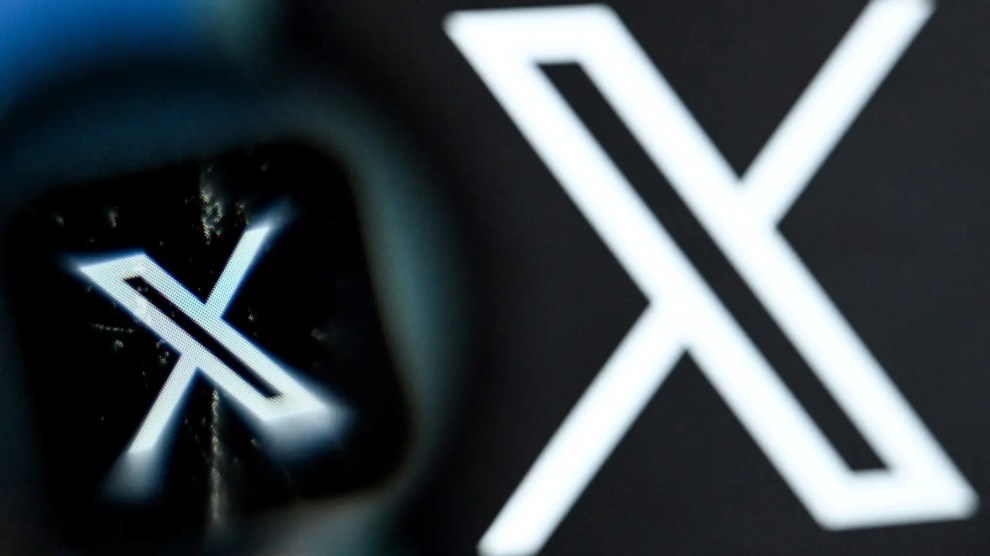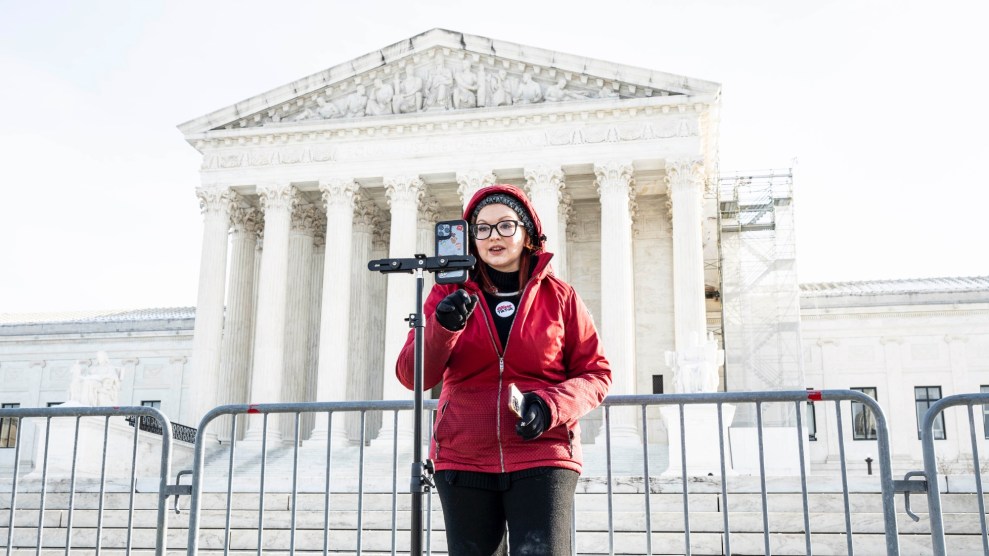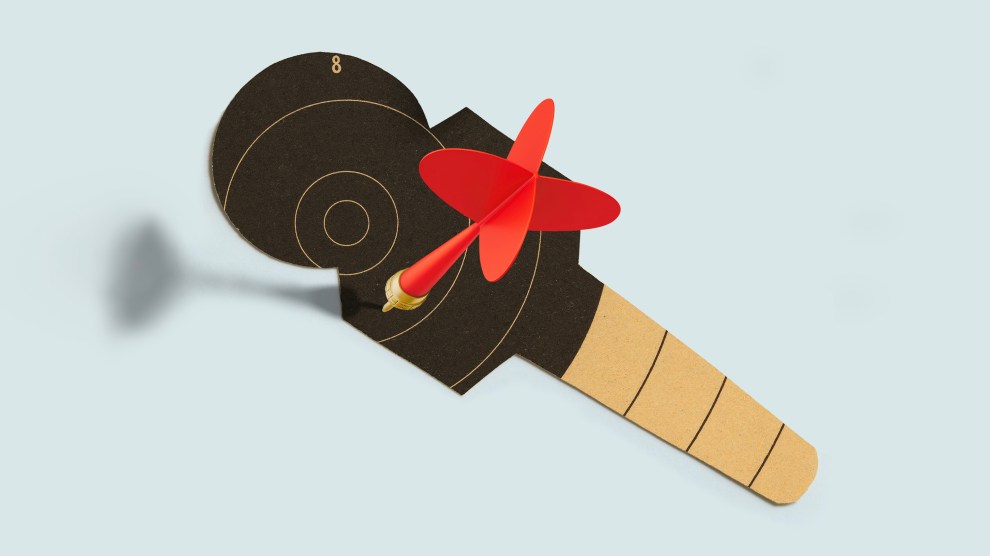
Sarah Barlyn, bottom left, is a reporter from WKCR, Columbia's student ratio station.Nandhini Srinivasan/WKCR
The student-run radio station at Columbia, WKCR, has been praised widely for its coverage of campus protests. The station’s popularity even led the website to, briefly, crash. And some have said the students should win a Pulitzer Prize. (This point helped poke at an irony embedded in such a situation: The prizes are given at Columbia University.)
Last week, we talked with two managers at WKCR about how the small group of reporters is doing this sensational work.
Today, we caught up with Sarah Barlyn, director of engineering at WKCR and a senior at Barnard College, for a follow-up.
Barlyn works mostly behind the scenes—“I actually don’t like my voice on radio,” she told us—and has, in her role, been in the field covering the protests. She was there last night when the New York Police Department arrested protesters who had occupied Hamilton Hall.
We chatted about her work, how WKCR has dealt with the high-profile pressure of reporting, and the historical resonances with 1968.
This interview has been condensed and edited for clarity.
Just to start, it’s been a lot going on: How are you doing?
I mean—yesterday, it was a little bit hard for everybody. Any Columbia student is a little bit shaken by what happened last night. I’m good. But, yes, the correspondents at WKCR have been sacrificing a lot of sleep to cover everything. So there’s a bit of a exhaustion among us. But we’re all very dedicated to our coverage. It’s hard to sleep when we know that we have a job to report on what’s going on.
How was reporting last night—when police arrested those occupying Hamilton Hall—for you?
There were three of our correspondents on the field in the middle of the night. I didn’t get there until 4:50 a.m. (I had gone home to get antibiotics because I’m recovering from a kidney infection.)
So, I entered campus with our correspondent Ted [Schmiedeler]. Then, around 5:00 a.m., they closed campus to only students who live in on-campus housing. So: we decided to stay there. Because we knew that if we left the site, we would not be allowed back on.
And so we were trying to get some rest in Butler Library, which was one of the only buildings that was open and accessible to us. Then, that building was evacuated. We really had nowhere else to go. And so we just really set up camp outside of Hamilton Hall.
Recovering from a kidney infection…I imagine having to use the restroom might be something that might be important? And you were locked out of the buildings?
I did report on that. Because at one point I went into Hartley, which is a freshman dorm, and I offered to show them my antibiotics. I’m like: I just genuinely am like a member of his community. And I’d really appreciate if I could use your facilities. But my request was denied.
I think that there were some buildings open—but they were further off, on the northwest side of campus.
So, what did you see last night?
We knew that an NYPD sweep was imminent due to the pretty much unprecedented lockdown of campus.
I was observing the west lawn.
So, I saw a lot of police officers—police officers in helmets and gear such as that—enter in mass from the Carman gate. (That gates that look onto 14th, between Amsterdam and Broadway.) But it was weird. They first went onto that street to disperse students who were watching. Then, the police come north—they start walking through campus and they encircled the west lawn encampment. And they began searching the encampment. I did not witness any arrests on the west lawn from my perspective. But I did see policemen searching the tents with flashlights. I would say over 100 police officers.
Then, myself and another correspondent saw another group of police officers—maybe 50 to 100—and they had entered from another area, I’m not sure where, and were headed to Hamilton Hall with sledge hammers and heavy machinery—because Hamilton Hall was barricaded.
At what point in the night did you start to question your own safety?
I actually—our safety was pretty much in question from even before there was police presence. We were under potentially disciplinary action, because there was, again, a lockdown. We weren’t entirely sure what protection we had as student journalists. But luckily all of us ended up being okay.
What’s something about yesterday that you’ll never forget?
I think the size of everything. It was definitely big—and organized. I mean, it was very strategic. I think there are a lot of things I won’t forget.
I mean, seeing the kind of heavy machinery being brought in. I guess that makes sense, because of the intense barricading of Hamilton Hall. But that’s just something that you don’t—you don’t expect to see that. You know what I mean? Like, that’s just not something that you really ever have the chance to see. Definitely the numbers of police officers, too. Although, I don’t know if that particularly surprised me.
And I’m just curious—what are you studying? You’re a senior writing a thesis. What’s it on?
I am actually focused on the student occupations of the five buildings during the 1968 protests at Columbia University, and one of those buildings was Hamilton Hall.
What’s it like seeing the thing that you’ve been studying play out once again?
It’s like looking into a mirror.
I could tell that the students in Hamilton Hall were inspired by the 1968 protests. Hamilton Hall has been occupied several times after ’68. Still, I could see a lot of the tactics—like the barricading by using the furniture in Hamilton Hall—it’s definitely inspired by ’68.
It’s a deja vu kind of feeling for you?
Yeah, and at one point that night, I find ourselves at the entrance of Hamilton Hall. I got caught up in a bit of an altercation between two students who were not protesters. And they were trying to resist the students who were protesting and barricading the doors. I felt like I was looking at the pictures that I had seen in all of the books that I read.
Have you had a moment just to exhale?
We had a bit of a brief moment at the station last night after we were finally all able to meet with each other. And that was a bit—I guess it was a deep breath. It was a little bit emotional for us. Just because we were all exhausted. And we had been separated from each other the whole day, and we have become very close. So just getting to kind of reunite was definitely a big moment for us.
But, I mean: I feel like we’re running a marathon that hasn’t ended yet.


















